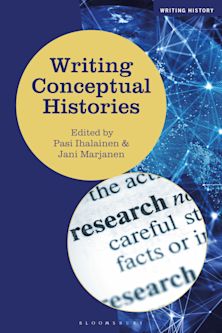- Home
- ACADEMIC
- History
- Historiography
- The Future of History
Inspection copy added to basket
Choose your preferred format. If you would prefer an ebook and it is not displayed below, please visit our inspection copies page.
Please note ebook inspection copies are fulfilled by VitalSource™.
Buy from Bloomsbury eTextBooks
You are now leaving the Bloomsbury Publishing website. Your eBook purchase will be with our partner https://www.vitalsource.com.
Your credit card statement will show this purchase originating from VitalSource Technologies. They will also provide any technical assistance you might require.
You must sign in to add this item to your wishlist. Please sign in or create an account
Description
In this radical reassessment, Alun Munslow challenges conventional notions of history and offers a new vision of historical thinking and practice. Deploying a range of concepts such as scepticism, aesthetics, ethics, standpoint, irony, authorship and a new understanding of truth, The Future of History examines history as a form of knowledge in itself, arguing that in the future the multiple forms of its expression will be as significant as its content. This thought-provoking, challenging and unique book offers a way forward for history after postmodernism and is essential reading for anyone asking the question 'what is history?'.
Table of Contents
PART I The Epistemological Problem for Historians
What Do Conventional Historians Believe?
Scepticism, Relativism and Ethics
Irony
Self, Standpoint and Subjectivity
PART II Responsibility
History and Aesthetics
Authorship
Form Before Content
Experimental History
Expressionist History
Conclusion
Glossary
Further Reading
Notes
Index.
Product details

| Published | 30 Jul 2010 |
|---|---|
| Format | Ebook (PDF) |
| Edition | 1st |
| Extent | 320 |
| ISBN | 9781137041463 |
| Imprint | Bloomsbury Academic |
| Publisher | Bloomsbury Publishing |
About the contributors

ONLINE RESOURCES
Bloomsbury Collections
This book is available on Bloomsbury Collections where your library has access.


































